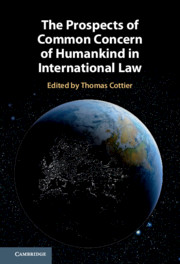3 results
14 - Legislatures and Effective Government: Raising Expectations for Representatives
- from Part VI - Legislatures, Representation, and Duties of Effective Self-Government
-
-
- Book:
- Constitutionalism and a Right to Effective Government?
- Published online:
- 20 October 2022
- Print publication:
- 27 October 2022, pp 181-192
-
- Chapter
- Export citation
1 - The Principle of Common Concern of Humankind
- from Part I - Theory
-
-
- Book:
- The Prospects of Common Concern of Humankind in International Law
- Published online:
- 04 May 2021
- Print publication:
- 13 May 2021, pp 3-92
-
- Chapter
- Export citation

The Prospects of Common Concern of Humankind in International Law
-
- Published online:
- 04 May 2021
- Print publication:
- 13 May 2021

